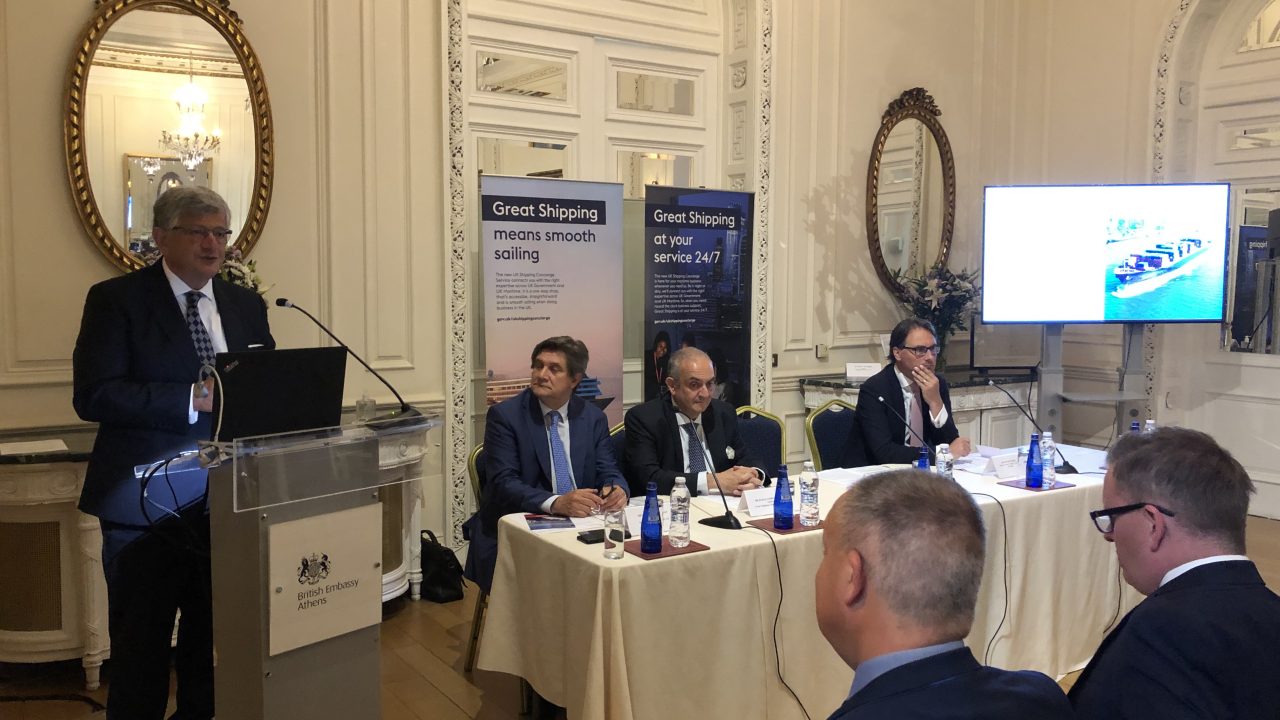Posted on: 14 June 2022
Maritime London organised a half-day seminar on ‘Trade and Shipping in a Disrupted World’ at the British Residence in Athens during Posidonia, supported by the UK Department for International Trade.
Introductory speeches were given by the Ambassador H.E. Matthew Lodge, UK Shipping Minister Robert Courts and Damien Oliver of the Maritime and Coastguard Agency, each of whom stressed the existing close cooperation between the maritime services’ sector in London and the Greek shipowning community. It was hoped that these ties would become even closer going forward, especially after introduction of the UK Shipping Concierge in late 2021, providing a single point of contact for maritime businesses looking to access the UK market.
Introducing the opening panel on Trends in Ship Finance, moderator Harry Theochari, Chair of Maritime London, spoke of the immense challenges posed by decarbonisation. It had been estimated that achieving IMO’s initial GHG reduction target of at least 50% by 2050 would cost in the region of $1.1 trillion to $1.4 trillion, he said, while achieving net zero over the same period would cost nearer $2 trillion.
Other speakers at the session were Haralambos Fafalios, Chairman of the Greek Shipping Cooperation Committee; Robartus Krol, Director, Sector Coverage – Shipping at ING Bank, and George Xiradakis, Founder of XRTC Business Consultants.
Fafalios spoke eloquently of the state of “green confusion” affecting owners in their choice of future fuels and propulsion methods for new vessels, none of which were without risk for the seafarers who would be sailing aboard the vessels, he pointed out. While there had been much emphasis on the E in the ESG (Environmental, Social and Governance) policies that are now a requirement for ship financiers and investors, he said, maybe it was time to think a bit more about the S for Seafarers – a point that drew a spontaneous round of applause from the 100-strong audience.
The following panel, moderated by Jos Standerwick, Chief Executive of Maritime London, discussed “Geopolitical Environment and Shipping”. An introductory markets overview was presented by Henry Curra, Global Head of Research at Braemar, who noted that traditional shipping market cycles of supply and demand were now becoming increasingly disrupted by geopolitical events with consequences on trade, which was becoming ‘weaponised’.
Other panellists were Chris Adams, Managing Director of Steamship Mutual; Mark Jackson, CEO of the Baltic Exchange; and Kirsty MacHardy of Stephenson Harwood LLP.
MacHardy pointed out that the sanctions landscape had become much more complex in recent years. While trade embargoes formerly tended to the preserve of the US, now there were EU and, following Brexit, UK rules to observe, she noted.
Adams reverted to the ‘S for Seafarers’ theme, pointing to the work that his P&I Club and other members of the International Group were carrying out to ensure the wellbeing of seafarers who had been badly impacted by the pandemic and were now in many cases suffering from the effects of geopolitical disruption as well.
The event closed with a networking buffet lunch, affording the opportunity for further discussions in the elegant surroundings of the Residence before everyone dispersed to continue their busy Posidonia Week.




